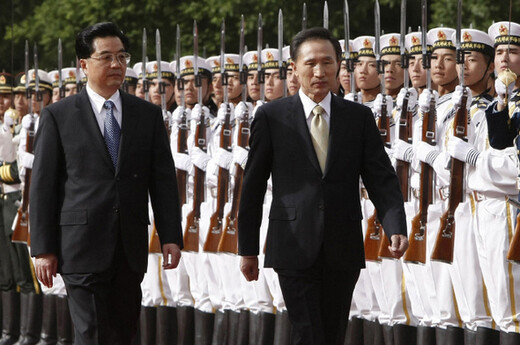hankyoreh
Links to other country sites 다른 나라 사이트 링크
S. Korea and China form strategic partnership

President Lee Myung-bak and his Chinese counterpart Hu Jintao had their first summit on May 27, after which they declared that the relationship between Korea and China would be upgraded from the current “cooperative partnership” to the level of a “strategic cooperative partnership.” The South Korean government is touting the partnership as the biggest gain from the summit, calling it an “improvement” in relations between the two countries.
It is yet to be seen, however, whether ties between the two nations have been solidified enough to accommodate such diplomatic rhetoric.
In a press conference held after the summit, Hu made no mention of Lee’s primary North Korea policy, Vision 3000, under which the president promised to increase the North’s per capita GNP to US$3,000 within 10 years if Pyongyang fully abandons its nuclear weapons program. This is likely to have a negative effect on relations between the two countries where North Korea is concerned. In comparison, President Lee’s current North Korea policy gained support from both Washington and Tokyo during summits with the two countries held in April.
The official agreement made between the two leaders also does not appear to have the substance of a joint statement made by former President Roh Moo-hyun and Hu after their summit in Seoul in November 2005. The statement said that China valued Korea’s policies for peace and prosperity on the Korean Peninsula.
Hu, however, did express his desire for an improvement in relations South and North Korea, saying, “I sincerely hope South and North Korea will establish peace and a process for cooperation.” This suggests that Hu wants Lee to go back to the sunshine policy of engagement practiced by former Presidents Kim Dae-jung and Roh Moo-hyun, though Lee has denounced the policy in the past as mere “flattery” of North Korea.
Remarkably, China’s “strategic partnerships,” the highest level of bilateral relations between China and foreign countries, differ from country to country. Relations between Korea and China, and between China and Russia, fall under the same category of strategic cooperative partnership, but differ sharply in substance. Hu and Russian President Dmitri Medvedev declared after their summit on May 23 that the development and installation of the U.S. missile defense system would not only cause a disruption in the world’s strategic balance, but would also go against nuclear non-proliferation efforts and peaceful use of outer space.
Lee and Hu, however, were unable to come to agreement on such sensitive global issues. It is likely that Korea’s position as an ally of the United States had an influence on the outcome of the discussion between the two leaders.
Please direct questions or comments to [englishhani@hani.co.kr]
Editorial・opinion
![[Column] Park Geun-hye déjà vu in Yoon Suk-yeol [Column] Park Geun-hye déjà vu in Yoon Suk-yeol](https://flexible.img.hani.co.kr/flexible/normal/500/300/imgdb/original/2024/0424/651713945113788.jpg) [Column] Park Geun-hye déjà vu in Yoon Suk-yeol
[Column] Park Geun-hye déjà vu in Yoon Suk-yeol![[Editorial] New weight of N. Korea’s nuclear threats makes dialogue all the more urgent [Editorial] New weight of N. Korea’s nuclear threats makes dialogue all the more urgent](https://flexible.img.hani.co.kr/flexible/normal/500/300/imgdb/original/2024/0424/7317139454662664.jpg) [Editorial] New weight of N. Korea’s nuclear threats makes dialogue all the more urgent
[Editorial] New weight of N. Korea’s nuclear threats makes dialogue all the more urgent- [Guest essay] The real reason Korea’s new right wants to dub Rhee a founding father
- [Column] ‘Choson’: Is it time we start referring to N. Korea in its own terms?
- [Editorial] Japan’s rewriting of history with Korea has gone too far
- [Column] The president’s questionable capacity for dialogue
- [Column] Are chaebol firms just pizza pies for families to divvy up as they please?
- [Column] Has Korea, too, crossed the Rubicon on China?
- [Correspondent’s column] In Japan’s alliance with US, echoes of its past alliances with UK
- [Editorial] Does Yoon think the Korean public is wrong?
Most viewed articles
- 1‘We must say no’: Seoul defense chief on Korean, USFK involvement in hypothetical Taiwan crisis
- 2N. Korean delegation’s trip to Iran shows how Pyongyang is leveraging ties with Moscow
- 346% of cases of violence against women in Korea perpetrated by intimate partner, study finds
- 4Amnesty notes ‘erosion’ of freedom of expression in Korea in annual human rights report
- 5‘Weddingflation’ breaks the bank for Korean couples-to-be
- 6[Column] Park Geun-hye déjà vu in Yoon Suk-yeol
- 7Will NewJeans end up collateral damage in internal feud at K-pop juggernaut Hybe?
- 8Korea sees more deaths than births for 52nd consecutive month in February
- 9“Parental care contracts” increasingly common in South Korea
- 10[Interview] Dear Korean men, It’s OK to admit you’re not always strong